Feeling comfortable in my discomfort
Reflections on my visit with the Bangladesh Centre for Worker Solidarity
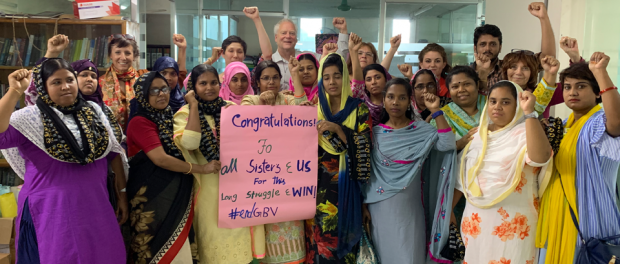 A photo of union leaders and the joint delegation standing in solidarity at the BCWS offices in Dhaka
A photo of union leaders and the joint delegation standing in solidarity at the BCWS offices in Dhaka
I was in Bangladesh for six days; I took 180 pages of notes and I found sadness, strength, and resilience.
I fell in love with a country and its people; I renewed my own belief in the power of many; I became comfortable in my discomfort.
I was in Bangladesh for six days.
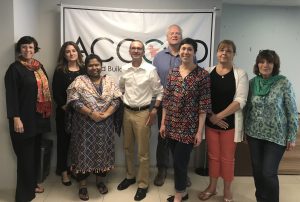
The 2019 Canadian Joint Labour Delegation to Bangladesh with Kalpona Akter (BCWS) and Rob Wayss, Executive Director—The Accord on Fire and Building Safety in Bangladesh (centre) at the offices of The Accord in Dhaka
In June of 2019, I travelled to Bangladesh with five labour colleagues from across the country, representing a cross-section of labour organizations. Our delegation consisted of representatives from the Public Service Alliance of Canada (PSAC), the Canadian Labour Congress (CLC), the United Steel Workers (USW), and the Centre international de solidarité ouvière (CISO), with me representing the Ontario Secondary School Teachers’ Federation (OSSTF/FEESO).
With a population of almost 163,000,000, Bangladesh is the world’s eighth most populous country. This many people live in a country roughly twice the size of New Brunswick, with over 18,000,000 Bangladeshis living in the capital, Dhaka, where we stayed for our visit. The country is a contrast of rural and urban, rich and poor, modern and traditional. I’m not sure how I’d actually describe Dhaka—it has a Blade Runner meets old world feel. There are children everywhere and the traffic is non-stop, and the heat topped out at 45 degrees most days. The energy was electric and the people were filled with kind smiles and curious glances for this group of six from the West. I fell in love the second I stepped off the plane.
Bangladesh’s history as a country is short; it gained its modern independence from India in 1972, but its cultural and social history is of course much older. It is deeply rooted in Indian and South Asian culture. It is also a country with a difficult history of labour rights and health and safety violations.
Over six years ago, on April 24, 2013, one of the deadliest industrial accidents the world has ever witnessed occurred at the Rana Plaza factory in Dhaka, Bangladesh. The collapse of the factory tower resulted in the death of 1,134 garment workers, with another 2,500 suffering injury. Only a year prior to this tragedy, the Tazreen factory fire Ashulia (a town just outside the capital city), killed 117 workers and injured another 200 workers when workers were unable to escape the blaze because the factory doors were locked and the windows barred.
Our goal was to meet and work with members of the Bangladesh Centre for Worker Solidarity (BCWS), and to visit with a small sampling of the country’s four million garment workers. The BCWS, founded in 2001, is a grassroots labour rights advocacy organization that works with 90,000 solidary members across the country. The organization provides training and support to various unions and labour organizations in Bangladesh as well as providing education, legal advice, and leadership training for labour rights activists. Kalpona Akter, the centre’s director and one of the founding members, was our host for the duration of the delegation.

Garment sector workers and BCWS members
Our agenda included meetings with the labour leaders connected to BCWS as well as with government officials (both Canadian and Bangladeshi). We also had meetings with grassroots organizers at the country’s factories, in order to hear from those who have been impacted by their work as labour organizers. We also made it a priority to meet with the factory-level workers to hear first-hand about the challenges they face working in the ready-made garment (RMG) sector. With over four million workers employed in the garment industry, 75 per cent of whom are women, the sector is central to the Bangladesh economy. It is, however, an industry that has experienced some of the most brutal working conditions and the most tragic industrial accidents in the world. Workers are paid poverty wages, face summary termination and violence for union involvement, are regularly denied basic rights guaranteed under Bangladesh’s labour laws, and are forced to work in tragically unsafe working environments.
The most striking of meetings were with the workers and with the labour union activists. I visited the home of two different workers, both women who work the factory floor as sewers for minimum wage (approximately $128 CAD a month). Meeting with Helen on my first night in Bangladesh, she welcomed me into her small home in the slums of Dhaka—a single room approximately 10’ x 6’ that held only a bed, a small fridge, a ceiling fan, and a variety of small household items and clothing. There was nowhere to stand so she asked me and my two colleagues to sit with her on her bed. The place was immaculate, but densely close, steamy. Its steel roof kept things dark and the fan helped keep the temperature down a bit. Helen lives in this room with her teenage son and her husband (who was away living in his village for a bit while he heals from an industrial injury to his hand). She spoke of her desire for better wages, how she feels the union at her factory has helped make things safer for the workers, and of her hope her son’s future. Her one dream is that he not have to work in the factory. She wants to save a small amount each month to pay for his education, but there is no free education in Bangladesh, and for those living in poverty, working in the factories, there is little hope of earning enough to send your children to school. Helen was warm, kind, a bit scared about talking openly about her union involvement, but steadfast in her belief that being a union member is important.
But being part of a union is filled with dangers. In 2012, a BCWS worker, Aminul Islam, was kidnapped, tortured, and killed, his body was dumped in the outskirts of Dhaka. Another BCWS leader, who we worked with and who has been a long-time friend of our labour delegation, told us his recent story of being kidnapped, blindfolded, taken into the forest, and told by his captors to “run.” He knew if he ran, he would be shot in the back, so he kneeled down in front of them and was eventually released. For our friend, the deep emotional wounds he still suffers don’t stop him from continuing to work as a labour activist.
On another day we visited a satellite office of BCWS in Ashulia (the same small town where the Tazreen factory fire happened in 2012) where we met with a group of over 30 workers fired during the 2019 “crackdown” on labour activism and unionism. Sparked by protests about a failure of the Bangladesh government to sufficiently raise the minimum wage, factory owners increased their backlash against workers who stand up for their rights. The crackdown included regular and widespread firings of workers, industry-wide blacklisting of these workers, false criminal charges laid against union members, and violent attacks by factory hired “thugs.” We had expected them to be angry, and they were, but what we didn’t expect was the level of their resilience and their commitment to one another.
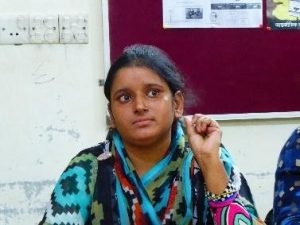
Labour leader, Mousumi, was jailed and blacklisted from employment in the garment industry because of her involvement in her union.
Mousumi sat just to my left in the small, packed meeting room; she had been fired and jailed for being part of a protest to protect a female colleague from continued sexual harassment by her boss. One of the delegation members asked her, “Once the criminal charges are dropped, once you hopefully get another job, will you still want to be part of a union?”
Her answer was simple and it left me shattered—“We will organize because the union is the only place a worker can have a voice. I faced charges because of my work family and I’ll continue to fight for them.”
This is true solidarity, this is true resilience. Mousumi would risk it all again to ensure the rights of her sisters, brothers, comrades, and colleagues are protected. She does this to fight for something more than a wage that sentences her to forever live in a slum, she does this to fight for health and safety regulations that keep workers from being burned alive in a factory that has its doors locked, she does this to protect her sisters from regularly experiencing gender based violence and harassment. She does this because she knows that together they can make a difference. She is comfortable in her discomfort.
Mousumi reminded me that sometimes that’s a powerful spot to be in, that sometimes it’s in this place that we can find our strength, that sometimes it’s all worth fighting for.
In the 12 months since this visit, OSSTF/FEESO has continued its support of BCWS and the garment workers in Bangladesh. The ongoing partnership includes financial and organizing support, national and international lobbying, and public advocacy for workers in the ready made garment sector.
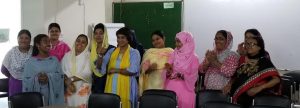
Women union leaders at the Dhaka offices of the BCWS
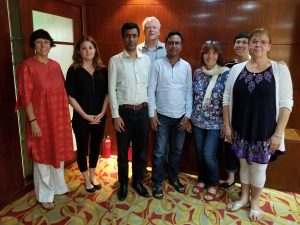
Members of the 2019 Delegation with union leaders Babul Akhter and Rashadul Alam Raju (centre)
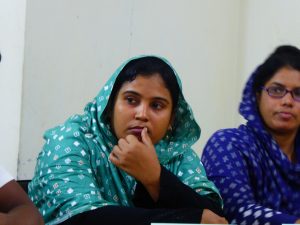
Lima, a factory worker

Leave a comment